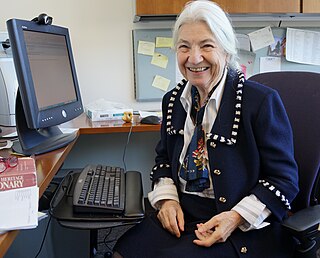Related Research Articles

Founded on 18 March 2011, the Max Planck Institute for Intelligent Systems (MPI-IS) is one of the 86 research institutes of the Max Planck Society. With locations in Stuttgart and Tübingen, it combines interdisciplinary research in the growing field of intelligent systems. Intelligent systems are becoming increasingly important in many areas of life – as virtual systems on the Internet or as cyber-physical systems in the physical world. Artificial intelligent systems can be used in a broad range of areas, for instance in autonomous vehicles or to diagnose and fight diseases.

Ayanna MacCalla Howard is an American roboticist, entrepreneur and educator currently serving as the dean of the College of Engineering at Ohio State University. Assuming the post in March 2021, Howard became the first woman to lead the Ohio State College of Engineering.

Ruzena Bajcsy is an American engineer and computer scientist who specializes in robotics. She is professor of electrical engineering and computer sciences at the University of California, Berkeley, where she is also director emerita of CITRIS.
Ming C. Lin is an American computer scientist and a Barry Mersky and Capital One Endowed Professor at the University of Maryland, College Park, where she is also the former chair of the Department of Computer Science. Prior to moving to Maryland in 2018, Lin was the John R. & Louise S. Parker Distinguished Professor of Computer Science at the University of North Carolina at Chapel Hill.
Maja Matarić is an American computer scientist, roboticist and AI researcher, and the Chan Soon-Shiong Distinguished Professor of Computer Science, Neuroscience, and Pediatrics at the University of Southern California. She is known for her work in human-robot interaction for socially assistive robotics, a new field she pioneered, which focuses on creating robots capable of providing personalized therapy and care that helps people help themselves, through social rather than physical interaction. Her work has focused on aiding special needs populations including the elderly, stroke patients, and children with autism, and has been deployed and evaluated in hospitals, therapy centers, schools, and homes. She is also known for her earlier work on robot learning from demonstration, swarm robotics, robot teams, and robot navigation.

Oussama Khatib is a roboticist and a professor of computer science at Stanford University, and a Fellow of the IEEE. He is credited with seminal work in areas ranging from robot motion planning and control, human-friendly robot design, to haptic interaction and human motion synthesis. His work's emphasis has been to develop theories, algorithms, and technologies, that control robot systems by using models of their physical dynamics. These dynamic models are used to derive optimal controllers for complex robots that interact with the environment in real-time.

Domenico Prattichizzo is an Italian scientist with a strong and international recognized expertise in the fields of Haptics, Robotics and, Wearable technology. His researches find their main applications in virtual and augmented reality scenarios and in the rehabilitation of people with upper and lower limbs, visual and cognitive impairments.
Stefan Schaal is a German-American computer scientist specializing in robotics, machine learning, autonomous systems, and computational neuroscience.
Jing Xiao is a professor of robotics and head of the department of robotics engineering at Worcester Polytechnic Institute (WPI). She is the director of the Adaptive and Intelligent Robotics Lab, as well as site director of WPI's ROSE-HUB. Xiao was named a Fellow of the Institute of Electrical and Electronics Engineers (IEEE) in 2013 for her contributions to robot compliant motion and haptic interaction. Xiao has also served as Associate Dean for Research and Graduate Studies and Program Director of the Computing and Information Systems Ph.D. Program while serving as a professor of computer science at University of North Carolina at Charlotte (UNC-Charlotte).

Antonio Bicchi is an Italian scientist interested in robotics and intelligent machines. He is professor at the University of Pisa and senior researcher at Istituto Italiano di Tecnologia in Genoa. He is an adjunct professor at the School of Biological and Health Systems Engineering of Arizona State University in Tempe, Arizona, US.

Jan Peters is a German computer scientist. He is Professor of Intelligent Autonomous Systems at Department of Computer Science of the Technische Universität Darmstadt.
Vivian Chu is an American roboticist and entrepreneur, specializing in the field of human-robot interaction. She is Chief Technology Officer at Diligent Robotics, a company she co-founded in 2017 for creating autonomous, mobile, socially intelligent robots.

Carlotta Berry is an American academic in the field of engineering. She is a professor of electrical and computer engineering at Rose-Hulman Institute of Technology. She is co-director of the Rose Building Undergraduate Diversity (ROSE-BUD) program. She is a co-founder of Black In Engineering and a co-founder of Black In Robotics.

John Kenneth Salisbury, Jr. is an American Roboticist and Research Professor Emeritus at Stanford University’s Computer Science Department and Stanford School of Medicine’s Department of Surgery. Salisbury is a researcher in the fields of robotics, haptics, and medical robotics. He is an inventor of over 50 patents and recipient of the 2011 IEEE Inaba Award for "Commercialization of Products in Medical Robotics, Robotics, and Haptics".
Sandra Hirche is a German control theorist and engineer. She is Liesel Beckmann Distinguished Professor of electrical and computer engineering at the Technical University of Munich, where she holds the chair of information-oriented control. Her research focuses on human–robot interaction, haptic technology, telepresence, and the control engineering and systems theory needed to make those technologies work.
Marcia Kilchenman O'Malley is an American mechanical engineer, the Thomas Michael Panos Family Professor in Mechanical Engineering and associate dean for research and innovation for the George R. Brown School of Engineering at Rice University. Her research concerns "systems for enhancing the human sensorimotor control system", including work on exoskeletons, neuroprosthetics, haptic technology, and brain–computer interfaces.
Lynne Edwards Parker is Associate Vice Chancellor and Director of the AI Tennessee Initiative at the University of Tennessee. Previously, she was Deputy United States Chief Technology Officer and Founding Director of the National Artificial Intelligence Initiative Office at the United States' White House Office of Science and Technology Policy. She is an American roboticist specializing in multi-robot systems, swarm robotics, and distributed artificial intelligence.
Allison Mariko Okamura is an American mechanical engineer and roboticist whose research concerns haptic technology, teleoperation, remote surgery, and robot-assisted surgery. She is the Richard W. Weiland Professor in the School of Engineering and a professor of mechanical engineering at Stanford University, where she directs the Collaborative Haptics and Robotics in Medicine (CHARM) laboratory and maintains a courtesy appointment as professor of computer science.
Hong Z. Tan is a Chinese-American researcher in haptic technology and haptic perception. She is a professor of electrical and computer engineering at Purdue University.
Karon E. MacLean is a computer scientist and mechanical engineer whose research involves haptic technology and affective haptics in human–computer interaction and human–robot interaction. Educated in the US, she works in Canada as a professor of computer science and Canada Research Chair in Interactive Human Systems Design at the University of British Columbia.
References
- 1 2 3 4 Curriculum vitae (PDF), Max Planck Institute for Intelligent Systems, June 3, 2021, retrieved 2022-06-27
- 1 2 3 Lichtman, Cassidy (May 2, 2014), Katherine Kuchenbecker: Science and Sport, Stanford Sports, retrieved 2022-06-27
- ↑ Witherspoon, Wendy (November 17, 1995), "Girls' Volleyball Playoffs: Brentwood Bears Down, Defeats St. Margaret's", Los Angeles Times, retrieved 2022-06-27
- ↑ Kerley, DeAnna (November 2, 2011), "Engineering professor brings science to the masses as a PopTech Fellow: Katherine Kuchenbecker was nominated one of Popular Science's 'Brilliant 10' of 2010", The Daily Pennsylvanian, retrieved 2022-06-27
- ↑ RAS Fellow listing (PDF), IEEE Robotics & Automation Society, 2022, retrieved 2022-06-27